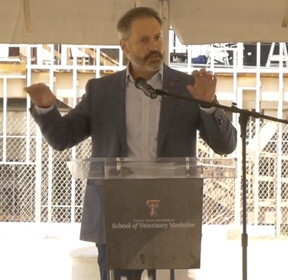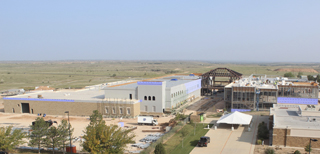Texas Tech announcement 288

VIN News Service screenshot
Dr. Guy Loneragan, dean of the Texas Tech University School of Veterinary Medicine, announced today that the program earned reasonable assurance, a first step toward full U.S. accreditation. In receiving the designation, the program overcame "the biggest academic obstacle in our path," he said during a press conference.
Five years of planning and preparing amid sometimes heavy opposition culminated today with news that Texas Tech University's budding veterinary school passed a critical step toward achieving accreditation, enabling it to open next year as the nation's 33rd veterinary program.
During a press conference this afternoon on Tech's campus in Amarillo, Dr. Guy Loneragan, a veterinary epidemiologist and dean of the School of Veterinary Medicine, announced that the program received "reasonable assurance" from the American Veterinary Medical Association Council on Education, which made the decision this month following a site visit in June. While reasonable assurance does not confer accreditation, it indicates that accreditors believe the program is on the right path and allows its students access to loans under Title VII of the U.S. Public Health Service Act. (New programs become eligible for full accreditation after their inaugural class graduates and takes the national licensing exam.)
Waving the letter of reasonable assurance, Loneragan drew applause from the audience. "With this notification, the school of veterinary medicine is open for business," he said. "By next week, hopeful students will be able to submit their application materials. Come January/February, we will be interviewing the future class of veterinary students here in Amarillo."
Applicants can apply to Texas Tech's veterinary school through the Texas Medical & Dental Schools Application Services, a state-funded online portal. The school aims to admit some 60 first-year students. Orientation is slated for Aug. 9, 2021; classes begin a week later, on Aug. 16. Tuition and fees are estimated to be $22,000 a year for Texas residents and $32,000 for nonresidents.
The school aims to address the veterinary service and educational needs of underserved, rural communities across Texas by recruiting and admitting students who want to work in large animal and rural practices. According to a press release, the curriculum "is focused on the competencies and skills necessary for success in practices that support these communities."
Opposition dimmed
Officials at Texas A&M University, one of the oldest and most venerable veterinary institutions in the country, say the same about their program in College Station.
Leaders at Texas A&M have been opposed to Tech's plan for a veterinary school since it was announced in 2015, believing that it duplicates the institution’s efforts to expand to West Texas A&M University in Canyon, a half-hour drive from Tech's Amarillo campus, and could siphon state funds allocated for the program. "… A&M can clearly meet all of the veterinary needs in Texas," former veterinary school Dean Eleanor Green wrote in an opinion piece published in a local newspaper in February 2019.
Eight months later, however, Green announced plans to leave Texas A&M for a senior position with the Animal Policy Group, a consulting firm that promotes growth in veterinary academia by providing advice to emerging programs on how to earn accreditation from the AVMA COE. A committee at Texas A&M is conducting a national search for her replacement. Dr. John August, serving as dean in the interim, has not spoken publicly about the Texas Tech venture.
Unopposed to having two veterinary programs in the state, the Texas Veterinary Medical Association passed a resolution that supports the objectives of Tech's veterinary school, which include "graduating practice-ready, competent and confident veterinarians who serve small, agricultural and regional communities across Texas."
Moving forward in the COVID-19 era
Texas Tech building 320

TTU System Facilities Planning & Construction photo
Laboratories and classrooms for the Texas Tech University School of Veterinary Medicine will be housed in a two-story, 185,000-square-foot building on campus in Amarillo. The complex, under construction, is slated for partial occupancy by the time the program's inaugural class begins in August 2021.
Dr. Tedd Mitchell, Texas Tech University System chancellor and a physician, praised the developing veterinary program in Amarillo for its potential to collaborate with human health sciences on campus. "We will have housed here a medical school, a pharmacy school and a veterinary medical school, all together ... and at a time when there are things like coronavirus," he said during the press conference.
He did not reference how the coronavirus is affecting the school. A campus tally shows 1,490 cases among students and employees, of which 220 are active infections.
The spread of coronavirus on university campuses is not unusual. Across the country, more than 88,000 students, staff and faculty have tested positive for SARS-CoV-2, the virus that causes COVID-19, and more cases are emerging, the New York Times recently reported. Loneragan, who told the VIN News Service in May that he considered the program "fortunate" to not be opening this fall because of unprecedented challenges caused by the pandemic, soon might face the quagmire of simultaneously teaching students and managing the virus's spread.
With a class of only 60 students, "we have lots of opportunities to spread out if we need to do so," Loneragan said by email.
Construction is underway on two sets of facilities: laboratory and classroom space on campus in Amarillo, and large-animal housing, called Mariposa Station, located about 2.5 miles from campus. Standing in front of the construction in Amarillo, Loneragan announced, "The facilities behind us are on track, on time and within budget."
The same is true of hiring, he said. A couple dozen faculty have joined the program, with more to come. "Many of them have left a promising career or just started a promising career to come to be part of something special," Loneragan said. "And with this faculty, we are not only open for business, we're ready for business."
Texas Tech's anticipated opening follows on the heels of two other new veterinary schools, at the University of Arizona in Tucson and at Long Island University in New York, both of which opened this fall.